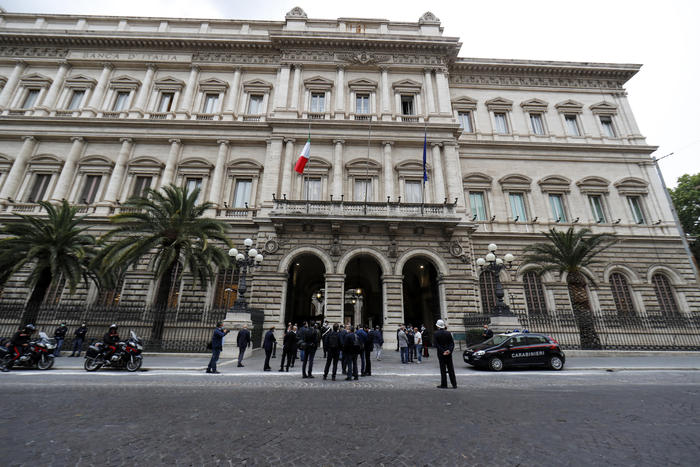Of money
consumption
Financial consumerism
Where are the fintech unicorns heading?
With all the pride in the fintech companies that came out of Israel and respected the world, it should be remembered that this is a market that belongs to the big players.
After the growth moderates, only the strong will survive and many of the companies worth six billion will turn out to be a bubble.
The "table does not lie" section recommends keeping your finger on the pulse
Tags
Fintech
visa
American Express
Ali Baba
stock
Unicorn
Roast Greenberg
Thursday, 25 November 2021, 12:35 Updated: 12:48
Share on Facebook
Share on WhatsApp
Share on general
Share on general
Share on Twitter
Share on Email
0 comments
The Israeli fintech is hot and the hot air continues to fill the balloon of local financial innovation, with about 10 unicorns (a private company valued at about $ 1 billion or more) created during the first half of the year.
The national pride in the local unicorn farm, however, does not yet take the fintech companies off the fringes of global financial innovation in which it is located, but rather in the face of domain giants such as Visa, PayPal, and SQUARE.
This is because in the international financial world, the concept of 'fintech' still connects to the activities of banks, credit cards and digital payment companies - mainly American ones, which also lead it on stock exchanges.
The five largest public companies in the world in the vague definition of the global financial system for FinTech are Visa, MasterCard, PayPal, American Express and SQUARE, which are traded on Wall Street USA at values ranging from 97.$ 4 billion recently, and up to $ 426.4 billion for the first time (see table).
More on Walla!
Winning Twist: Thai salad with Tamara Aharoni sirloin
To the full article
The five global fintech giants (Photo: Walla !, no)
"'Fintech' is a concept that expresses a large market that in international eyes contains the entire financial system," explains Sergei Vaschonok, a senior analyst at Oppenheimer Investment House. .
Israeli companies are still very small in the field, and the reference to 'smallness' also applies to those unicorns in question, including those that reached a value of about $ 10 billion. At the end of the day Visa, for example, leads the innovation of the American financial system today.
There is room in this system for small players as well, but it should be understood that it is on the margins of the market. The leading companies in the field in the world remained the American companies, led by: 'Visa', 'MasterCard', and 'PayPal', each in its own direction.
After them, in terms of market value, the American Express also lags behind, which in the American view is a financial institution of its own and actually functions as a bank,And the mobile payment giant 'SQUARE'. All five are traded on Wall Street. "
The financial system is desperate for solutions that facilitate and make its parts accessible to consumers and suppliers of entities operating in the market, but unlike the small state of Israel, where it is relatively easy to pilot in the field, international giants make it more difficult for Israeli fintech companies to justify themselves in the near future.
"On the one hand, there is great potential for innovation in the financial systems," Vaschunok continues, "especially in the United States, as its financial payments market lags far behind Israel or Singapore, for example, and many of its transactions are still made in cash.
Even in the internal work of the banks themselves there are still many paperwork transfers. So even some of the big companies in the US, relatively speaking, are the ones that take care of check scanning and deposit systems, for example.
But on the other hand, it is difficult to assimilate new systems in American banks, as these are huge entities, some of which are deployed with hundreds and thousands of branches in the US and abroad. If you look at a body like Bank of America for example, its size in the US alone will make it difficult to implement and assimilate any system, even before we enter the culture of cash transactions that still dominates the US.
Another thing to keep in mind is that while the same fintech industry makes financial services accessible to the consumer, in the end it is still a kind of interface only for banks.
To illustrate, then in a large market outside the US such as China, most payments today are made via mobile phones. The strongest players there are Alibay, Alipay, and Tencent via WeChat ).
Both each hold about half of the Chinese market more or less (50% -50%), but are still just an interface for banks.
The latter are the ones who perform all the clearing and actual transfer of the payments, and in which the accounts are still located. "
Sergei Verschonok, Senior Analyst at Oppenheimer Investment House (Photo: PR)
"PayPal has been greatly weakened"
But while Israeli companies receive a perpetual cash infusion after arousing the dream of return among investors, four of the five giant international public companies in the field have experienced an average decline of about 10.6% since the beginning of the year.
Most of the declines were experienced by the companies during last October, against the background of the publication of the financial statements for the third quarter of the year. This is when the S & P500 index, for example, rose by 24.7% during the same period.
The highest decline is attributed to the share of the digital payments giant - PayPal, which fell about 19.1% from the beginning of the year until the last trading day examined (see table). Alongside it, the credit giants 'Visa' and 'Mastercard' also fell by about 10.6% and 10% for the same period, respectively.
"PayPal" has weakened greatly, especially in recent months "Verschonok specification" after a series of disappointments in the results of its activities, especially in the context of the corona.Which led to an increase in the need for a payment platform.
As a result, it experienced an increase in the volume of transactions from which it charged a commission, along with an increase in the volume of customers.
But with the return to routine, the volume of transactions, as well as the volume of new customers joining, decreased.
In the 'Visa' and 'MasterCard' battles the Corona worked upside down.
During the epidemic their activity declined due to the paucity of physical transactions in stores and markets, and purchases the amount of which was relatively cheap to pre-corona purchases made physically.
In addition, there were fewer trips abroad, which led to at least currency exchange fees - which is a very lucrative activity among American credit card companies, and these three affected these huge credit revenues.
The companies that are known to us in Israel as credit card companies are the largest fintech companies in the world (Photo: ShutterStock, Libby)
"American Express operates as a bank for everything"
With the return to routine, however, the volume of transactions, as well as their amount, is steadily rising among the two credit giants leading the fintech activity in the US, and if we take Visa as an example, then the latter shows profitability rates of about 50%. "Along with a business model that is almost risk-free.
It should be remembered that this is a company that receives rewards from banks for using its credit card, along with income for all ironing out of businesses and receiving the same currency conversion fees, which led its share to moderate the declines during the corona."
In contrast, the stock of another credit company - 'American Express', leads the table of the five American public fintech giants, after a jump of about 41.3% in its share price since the beginning of the year.
"American Express operates as a financial institution for all intents and purposes and is supervised by the central bank as such," Verschonok explains, "and therefore its business model is more risky and includes credit risks.
However, since it operates as a bank on the one hand, alongside operating as a credit company on the other, it is growing faster than a bank with a return to routine, which has probably led to an upward launch of its stock.
In this context, it is important to raise the issue of risk among the entire fintech industry, including those Israeli unicorns.
The root of the problem that may arise in the fintech sector does not begin with the value of the companies obtained, since the current year does not represent at all, in what is perceived as an underestimation of the level of risk in the activities of those companies.
Take for example the fintech company that operates through artificial intelligence to handle risky loans.
After all, most of the information is only in the hands of the banks, while the same company is only beginning to study the market and the risks in it through its first customers, and without having data of credit history, for example.
Loan market: The bank has a clear advantage over most fintech companies (Photo: ShutterStock)
A loan bubble?
Banks will not give a loan without a credit history, but fintech companies do, and if you take the lesson of 2008, then there is a high risk in giving loans to customers without history, which is much more risky than a high multiplier, as it is a possibility of the whole business collapsing.
In this aspect one certainly sees signs similar to the beginning of the collapse in 2008, which caused the collapse of the entire financial world. So as long as the economy grows and interest rates are low, it works. But what will happen when the economy slows and interest rates rise?
"So true, banks are losing market share to other companies, but it's mostly to those with a more problematic credit history, and companies that give loans that focus on market segments such as buying cars or student loans."
So what does the future hold for the Israeli fintech industry and will the rate of recruitment built on dreams of return really materialize soon?
Capital market officials believe that the global financial system will have to be managed, especially in the face of the entry of strong competitors such as retail giants on parts that were previously reserved only for them.
In addition, in order to maintain their place in the future, banks, like other entities in the financial system, will have to adapt to the nature of the conduct of consumers such as Generation Y, who require transparent, accessible, fast, simple services and digital means.
The section "The table does not lie" is also published in the Maariv Business Supplement, November 26
Share on Facebook
Share on WhatsApp
Share on general
Share on general
Share on Twitter
Share on Email
0 comments



/cloudfront-eu-central-1.images.arcpublishing.com/prisa/F5MUQT6JFZFAZGDYBYG5BZQJIQ.jpg)
/cloudfront-eu-central-1.images.arcpublishing.com/prisa/CY3MBVCW4BE4ZPFNI4WI4AQ6IE.jpg)




